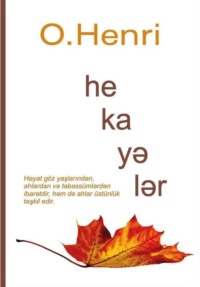 полная версия
полная версияRolling Stones
"Is this tale true?" they demanded of the Candidate.
"No, by gosh, it ain't!" he replied, pointing a trembling finger at the Democratic Chairman. "There stands the man who has concocted the whole scheme. It is an infernal, unfair political trick to lose votes for our party. How far has thing gone?" he added, turning savagely to the detective.
"All the newspapers have my written report on the matter, and the Statesman will have it in plate matter next week," said Tictocq, complacently.
"All is lost!" said the Populists, turning toward the door.
"For God's sake, my friends," pleaded the Candidate, following them; "listen to me; I swear before high heaven that I never wore a pair of socks in my life. It is all a devilish campaign lie."
The Populists turn their backs.
"The damage is already done," they said. "The people have heard the story. You have yet time to withdraw decently before the race."
All left the room except Tictocq and the Democrats.
"Let's all go down and open a bottle of fizz on the Finance Committee," said the Chairman of the Executive Committee, Platform No. 2.
TRACKED TO DOOM
ORTHE MYSTERY OF THE RUE DE PEYCHAUD'Tis midnight in Paris.
A myriad of lamps that line the Champs Elysées and the Rouge et Noir, cast their reflection in the dark waters of the Seine as it flows gloomily past the Place Vendôme and the black walls of the Convent Notadam.
The great French capital is astir.
It is the hour when crime and vice and wickedness reign.
Hundreds of fiacres drive madly through the streets conveying women, flashing with jewels and as beautiful as dreams, from opera and concert, and the little bijou supper rooms of the Café Tout le Temps are filled with laughing groups, while bon mots, persiflage and repartee fly upon the air – the jewels of thought and conversation.
Luxury and poverty brush each other in the streets. The homeless gamin, begging a sou with which to purchase a bed, and the spendthrift roué, scattering golden louis d'or, tread the same pavement.
When other cities sleep, Paris has just begun her wild revelry.
The first scene of our story is a cellar beneath the Rue de Peychaud.
The room is filled with smoke of pipes, and is stifling with the reeking breath of its inmates. A single flaring gas jet dimly lights the scene, which is one Rembrandt or Moreland and Keisel would have loved to paint.
A garçon is selling absinthe to such of the motley crowd as have a few sous, dealing it out in niggardly portions in broken teacups.
Leaning against the bar is Carnaignole Cusheau – generally known as the Gray Wolf.
He is the worst man in Paris.
He is more than four feet ten in height, and his sharp, ferocious looking face and the mass of long, tangled gray hair that covers his face and head, have earned for him the name he bears.
His striped blouse is wide open at the neck and falls outside of his dingy leather trousers. The handle of a deadly looking knife protrudes from his belt. One stroke of its blade would open a box of the finest French sardines.
"Voilà, Gray Wolf," cries Couteau, the bartender. "How many victims to-day? There is no blood upon your hands. Has the Gray Wolf forgotten how to bite?"
"Sacrè Bleu, Mille Tonnerre, by George," hisses the Gray Wolf. "Monsieur Couteau, you are bold indeed to speak to me thus.
"By Ventre St. Gris! I have not even dined to-day. Spoils indeed. There is no living in Paris now. But one rich American have I garroted in a fortnight.
"Bah! those Democrats. They have ruined the country. With their income tax and their free trade, they have destroyed the millionaire business. Carrambo! Diable! D–n it!"
"Hist!" suddenly says Chamounix the rag-picker, who is worth 20,000,000 francs, "some one comes!"
The cellar door opened and a man crept softly down the rickety steps. The crowd watches him with silent awe.
He went to the bar, laid his card on the counter, bought a drink of absinthe, and then drawing from his pocket a little mirror, set it up on the counter and proceeded to don a false beard and hair and paint his face into wrinkles, until he closely resembled an old man seventy-one years of age.
He then went into a dark corner and watched the crowd of people with sharp, ferret-like eyes.
Gray Wolf slipped cautiously to the bar and examined the card left by the newcomer.
"Holy Saint Bridget!" he exclaims. "It is Tictocq, the detective."
Ten minutes later a beautiful woman enters the cellar. Tenderly nurtured, and accustomed to every luxury that money could procure, she had, when a young vivandière at the Convent of Saint Susan de la Montarde, run away with the Gray Wolf, fascinated by his many crimes and the knowledge that his business never allowed him to scrape his feet in the hall or snore.
"Parbleu, Marie," snarls the Gray Wolf. "Que voulez vous? Avez-vous le beau cheval de mon frère, oule joli chien de votre père?"
"No, no, Gray Wolf," shouts the motley group of assassins, rogues and pickpockets, even their hardened hearts appalled at his fearful words. "Mon Dieu! You cannot be so cruel!"
"Tiens!" shouts the Gray Wolf, now maddened to desperation, and drawing his gleaming knife. "Voilà! Canaille! Tout le monde, carte blanche enbonpoint sauve que peut entre nous revenez nous a nous moutons!"
The horrified sans-culottes shrink back in terror as the Gray Wolf seizes Maria by the hair and cuts her into twenty-nine pieces, each exactly the same size.
As he stands with reeking hands above the corpse, amid a deep silence, the old, gray-bearded man who has been watching the scene springs forward, tears off his false beard and locks, and Tictocq, the famous French detective, stands before them.
Spellbound and immovable, the denizens of the cellar gaze at the greatest modern detective as he goes about the customary duties of his office.
He first measures the distance from the murdered woman to a point on the wall, then he takes down the name of the bartender and the day of the month and the year. Then drawing from his pocket a powerful microscope, he examines a little of the blood that stands upon the floor in little pools.
"Mon Dieu!" he mutters, "it is as I feared – human blood."
He then enters rapidly in a memorandum book the result of his investigations, and leaves the cellar.
Tictocq bends his rapid steps in the direction of the headquarters of the Paris gendarmerie, but suddenly pausing, he strikes his hand upon his brow with a gesture of impatience.
"Mille tonnerre," he mutters. "I should have asked the name of that man with the knife in his hand."
It is reception night at the palace of the Duchess Valerie du Bellairs.
The apartments are flooded with a mellow light from paraffine candles in solid silver candelabra.
The company is the most aristocratic and wealthy in Paris.
Three or four brass bands are playing behind a portière between the coal shed, and also behind time. Footmen in gay-laced livery bring in beer noiselessly and carry out apple-peelings dropped by the guests.
Valerie, seventh Duchess du Bellairs, leans back on a solid gold ottoman on eiderdown cushions, surrounded by the wittiest, the bravest, and the handsomest courtiers in the capital.
"Ah, madame," said the Prince Champvilliers, of Palais Royale, corner of Seventy-third Street, "as Montesquiaux says, 'Rien de plus bon tutti frutti' – Youth seems your inheritance. You are to-night the most beautiful, the wittiest in your own salon. I can scarce believe my own senses, when I remember that thirty-one years ago you – "
"Saw it off!" says the Duchess peremptorily.
The Prince bows low, and drawing a jewelled dagger, stabs himself to the heart.
"The displeasure of your grace is worse than death," he says, as he takes his overcoat and hat from a corner of the mantelpiece and leaves the room.
"Voilà," says Bèebè Francillon, fanning herself languidly. "That is the way with men. Flatter them, and they kiss your hand. Loose but a moment the silken leash that holds them captive through their vanity and self-opinionativeness, and the son-of-a-gun gets on his ear at once. The devil go with him, I say."
"Ah, mon Princesse," sighs the Count Pumpernickel, stooping and whispering with eloquent eyes into her ear. "You are too hard upon us. Balzac says, 'All women are not to themselves what no one else is to another.' Do you not agree with him?"
"Cheese it!" says the Princess. "Philosophy palls upon me. I'll shake you."
"Hosses?" says the Count.
Arm and arm they go out to the salon au Beurre.
Armande de Fleury, the young pianissimo danseuse from the Folies Bergère is about to sing.
She slightly clears her throat and lays a voluptuous cud of chewing gum upon the piano as the first notes of the accompaniment ring through the salon.
As she prepares to sing, the Duchess du Bellairs grasps the arm of her ottoman in a vice-like grip, and she watches with an expression of almost anguished suspense.
She scarcely breathes.
Then, as Armande de Fleury, before uttering a note, reels, wavers, turns white as snow and falls dead upon the floor, the Duchess breathes a sigh of relief.
The Duchess had poisoned her.
Then the guests crowd about the piano, gazing with bated breath, and shuddering as they look upon the music rack and observe that the song that Armande came so near singing is "Sweet Marie."
Twenty minutes later a dark and muffled figure was seen to emerge from a recess in the mullioned wall of the Arc de Triomphe and pass rapidly northward.
It was no other than Tictocq, the detective.
The network of evidence was fast being drawn about the murderer of Marie Cusheau.
It is midnight on the steeple of the Cathedral of Notadam.
It is also the same time at other given points in the vicinity.
The spire of the Cathedral is 20,000 feet above the pavement, and a casual observer, by making a rapid mathematical calculation, would have readily perceived that this Cathedral is, at least, double the height of others that measure only 10,000 feet.
At the summit of the spire there is a little wooden platform on which there is room for but one man to stand.
Crouching on this precarious footing, which swayed, dizzily with every breeze that blew, was a man closely muffled, and disguised as a wholesale grocer.
Old François Beongfallong, the great astronomer, who is studying the sidereal spheres from his attic window in the Rue de Bologny, shudders as he turns his telescope upon the solitary figure upon the spire.
"Sacrè Bleu!" he hisses between his new celluloid teeth. "It is Tictocq, the detective. I wonder whom he is following now?"
While Tictocq is watching with lynx-like eyes the hill of Montmartre, he suddenly hears a heavy breathing beside him, and turning, gazes into the ferocious eyes of the Gray Wolf.
Carnaignole Cusheau had put on his W. U. Tel. Co. climbers and climbed the steeple.
"Parbleu, monsieur," says Tictocq. "To whom am I indebted for the honor of this visit?"
The Gray Wolf smiled softly and depreciatingly.
"You are Tictocq, the detective?" he said.
"I am."
"Then listen. I am the murderer of Marie Cusheau. She was my wife and she had cold feet and ate onions. What was I to do? Yet life is sweet to me. I do not wish to be guillotined. I have heard that you are on my track. Is it true that the case is in your hands?"
"It is."
"Thank le bon Dieu, then, I am saved."
The Gray Wolf carefully adjusts the climbers on his feet and descends the spire.
Tictocq takes out his notebook and writes in it.
"At last," he says, "I have a clue."
Monsieur le Compte Carnaignole Cusheau, once known as the Gray Wolf, stands in the magnificent drawing-room of his palace on East 47th Street.
Three days after his confession to Tictocq, he happened to look in the pockets of a discarded pair of pants and found twenty million francs in gold.
Suddenly the door opens and Tictocq, the detective, with a dozen gensd'arme, enters the room.
"You are my prisoner," says the detective.
"On what charge?"
"The murder of Marie Cusheau on the night of August 17th."
"Your proofs?"
"I saw you do it, and your own confession on the spire of Notadam."
The Count laughed and took a paper from his pocket. "Read this," he said, "here is proof that Marie Cusheau died of heart failure."
Tictocq looked at the paper.
It was a check for 100,000 francs.
Tictocq dismissed the gensd'arme with a wave of his hand.
"We have made a mistake, monsieurs," he said, but as he turns to leave the room, Count Carnaignole stops him.
"One moment, monsieur."
The Count Carnaignole tears from his own face a false beard and reveals the flashing eyes and well-known features of Tictocq, the detective.
Then, springing forward, he snatches a wig and false eyebrows from his visitor, and the Gray Wolf, grinding his teeth in rage, stands before him.
The murderer of Marie Cusheau was never discovered.
A SNAPSHOT AT THE PRESIDENT
[This is the kind of waggish editorial O. Henry was writing in 1894 for the readers of The Rolling Stone. The reader will do well to remember that the paper was for local consumption and that the allusions are to a very special place and time.]
(It will be remembered that about a month ago there were special rates offered to the public for a round trip to the City of Washington. The price of the ticket being exceedingly low, we secured a loan of twenty dollars from a public-spirited citizen of Austin, by mortgaging our press and cow, with the additional security of our brother's name and a slight draught on Major Hutchinson for $4,000.
We purchased a round trip ticket, two loaves of Vienna bread, and quite a large piece of cheese, which we handed to a member of our reportorial staff, with instructions to go to Washington, interview President Cleveland, and get a scoop, if possible, on all other Texas papers.
Our reporter came in yesterday morning, via the Manor dirt road, with a large piece of folded cotton bagging tied under each foot.
It seems that he lost his ticket in Washington, and having divided the Vienna bread and cheese with some disappointed office seekers who were coming home by the same route, he arrived home hungry, desiring food, and with quite an appetite.
Although somewhat late, we give his description of his interview with President Cleveland.)
I am chief reporter on the staff of The Rolling Stone.
About a month ago the managing editor came into the room where we were both sitting engaged in conversation and said:
"Oh, by the way, go to Washington and interview President Cleveland."
"All right," said I. "Take care of yourself."
Five minutes later I was seated in a palatial drawing-room car bounding up and down quite a good deal on the elastic plush-covered seat.
I shall not linger upon the incidents of the journey. I was given carte blanche to provide myself with every comfort, and to spare no expense that I could meet. For the regalement of my inside the preparations had been lavish. Both Vienna and Germany had been called upon to furnish dainty viands suitable to my palate.
I changed cars and shirts once only on the journey. A stranger wanted me to also change a two-dollar bill, but I haughtily declined.
The scenery along the entire road to Washington is diversified. You find a portion of it on one hand by looking out of the window, and upon turning the gaze upon the other side the eye is surprised and delighted by discovering some more of it.
There were a great many Knights of Pythias on the train. One of them insisted upon my giving him the grip I had with me, but he was unsuccessful.
On arriving in Washington, which city I instantly recognized from reading the history of George, I left the car so hastily that I forgot to fee Mr. Pullman's representative.
I went immediately to the Capitol.
In a spirit of jeu d'esprit I had had made a globular representation of a "rolling stone." It was of wood, painted a dark color, and about the size of a small cannon ball. I had attached to it a twisted pendant about three inches long to indicate moss. I had resolved to use this in place of a card, thinking people would readily recognize it as an emblem of my paper.
I had studied the arrangement of the Capitol, and walked directly to Mr. Cleveland's private office.
I met a servant in the hall, and held up my card to him smilingly.
I saw his hair rise on his head, and he ran like a deer to the door, and, lying down, rolled down the long flight of steps into the yard.
"Ah," said I to myself, "he is one of our delinquent subscribers."
A little farther along I met the President's private secretary, who had been writing a tariff letter and cleaning a duck gun for Mr. Cleveland.
When I showed him the emblem of my paper he sprang out of a high window into a hothouse filled with rare flowers.
This somewhat surprised me.
I examined myself. My hat was on straight, and there was nothing at all alarming about my appearance.
I went into the President's private office.
He was alone. He was conversing with Tom Ochiltree. Mr. Ochiltree saw my little sphere, and with a loud scream rushed out of the room.
President Cleveland slowly turned his eyes upon me.
He also saw what I had in my hand, and said in a husky voice:
"Wait a moment, please."
He searched his coat pocket, and presently found a piece of paper on which some words were written.
He laid this on his desk and rose to his feet, raised one hand above him, and said in deep tones:
"I die for Free Trade, my country, and – and – all that sort of thing."
I saw him jerk a string, and a camera snapped on another table, taking our picture as we stood.
"Don't die in the House, Mr. President," I said. "Go over into the Senate Chamber."
"Peace, murderer!" he said. "Let your bomb do its deadly work."
"I'm no bum," I said, with spirit. "I represent The Rolling Stone, of Austin, Texas, and this I hold in my hand does the same thing, but, it seems, unsuccessfully."
The President sank back in his chair greatly relieved.
"I thought you were a dynamiter," he said. "Let me see; Texas! Texas!" He walked to a large wall map of the United States, and placing his finger thereon at about the location of Idaho, ran it down in a zigzag, doubtful way until he reached Texas.
"Oh, yes, here it is. I have so many things on my mind, I sometimes forget what I should know well.
"Let's see; Texas? Oh, yes, that's the State where Ida Wells and a lot of colored people lynched a socialist named Hogg for raising a riot at a camp-meeting. So you are from Texas. I know a man from Texas named Dave Culberson. How is Dave and his family? Has Dave got any children?"
"He has a boy in Austin," I said, "working around the Capitol."
"Who is President of Texas now?"
"I don't exactly – "
"Oh, excuse me. I forgot again. I thought I heard some talk of its having been made a Republic again."
"Now, Mr. Cleveland," I said, "you answer some of my questions."
A curious film came over the President's eyes. He sat stiffly in his chair like an automaton.
"Proceed," he said.
"What do you think of the political future of this country?"
"I will state that political exigencies demand emergentistical promptitude, and while the United States is indissoluble in conception and invisible in intent, treason and internecine disagreement have ruptured the consanguinity of patriotism, and – "
"One moment, Mr. President," I interrupted; "would you mind changing that cylinder? I could have gotten all that from the American Press Association if I had wanted plate matter. Do you wear flannels? What is your favorite poet, brand of catsup, bird, flower, and what are you going to do when you are out of a job?"
"Young man," said Mr. Cleveland, sternly, "you are going a little too far. My private affairs do not concern the public."
I begged his pardon, and he recovered his good humor in a moment.
"You Texans have a great representative in Senator Mills," he said. "I think the greatest two speeches I ever heard were his address before the Senate advocating the removal of the tariff on salt and increasing it on chloride of sodium."
"Tom Ochiltree is also from our State," I said.
"Oh, no, he isn't. You must be mistaken," replied Mr. Cleveland, "for he says he is. I really must go down to Texas some time, and see the State. I want to go up into the Panhandle and see if it is really shaped like it is on the map."
"Well, I must be going," said I.
"When you get back to Texas," said the President, rising, "you must write to me. Your visit has awakened in me quite an interest in your State which I fear I have not given the attention it deserves. There are many historical and otherwise interesting places that you have revived in my recollection – the Alamo, where Davy Jones fell; Goliad, Sam Houston's surrender to Montezuma, the petrified boom found near Austin, five-cent cotton and the Siamese Democratic platform born in Dallas. I should so much like to see the gals in Galveston, and go to the wake in Waco. I am glad I met you. Turn to the left as you enter the hall and keep straight on out." I made a low bow to signify that the interview was at an end, and withdrew immediately. I had no difficulty in leaving the building as soon as I was outside.
I hurried downtown in order to obtain refreshments at some place where viands had been placed upon the free list.
I shall not describe my journey back to Austin. I lost my return ticket somewhere in the White House, and was forced to return home in a manner not especially beneficial to my shoes. Everybody was well in Washington when I left, and all send their love.
AN UNFINISHED CHRISTMAS STORY
[Probably begun several years before his death. Published, as it here appears, in Short Stories, January, 1911.]
Now, a Christmas story should be one. For a good many years the ingenious writers have been putting forth tales for the holiday numbers that employed every subtle, evasive, indirect and strategic scheme they could invent to disguise the Christmas flavor. So far has this new practice been carried that nowadays when you read a story in a holiday magazine the only way you can tell it is a Christmas story is to look at the footnote which reads: ["The incidents in the above story happened on December 25th. – Ed."]
There is progress in this; but it is all very sad. There are just as many real Christmas stories as ever, if we would only dig 'em up. Me, I am for the Scrooge and Marley Christmas story, and the Annie and Willie's prayer poem, and the long lost son coming home on the stroke of twelve to the poorly thatched cottage with his arms full of talking dolls and popcorn balls and – Zip! you hear the second mortgage on the cottage go flying off it into the deep snow.
So, this is to warn you that there is no subterfuge about this story – and you might come upon stockings hung to the mantel and plum puddings and hark! the chimes! and wealthy misers loosening up and handing over penny whistles to lame newsboys if you read further.
Once I knocked at a door (I have so many things to tell you I keep on losing sight of the story). It was the front door of a furnished room house in West 'Teenth Street. I was looking for a young illustrator named Paley originally and irrevocably from Terre Haute. Paley doesn't enter even into the first serial rights of this Christmas story; I mention him simply in explaining why I came to knock at the door – some people have so much curiosity.
The door was opened by the landlady. I had seen hundreds like her. And I had smelled before that cold, dank, furnished draught of air that hurried by her to escape immurement in the furnished house.
She was stout, and her face and lands were as white as though she had been drowned in a barrel of vinegar. One hand held together at her throat a buttonless flannel dressing sacque whose lines had been cut by no tape or butterick known to mortal woman. Beneath this a too-long, flowered, black sateen skirt was draped about her, reaching the floor in stiff wrinkles and folds.


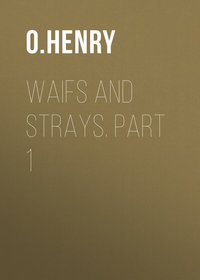
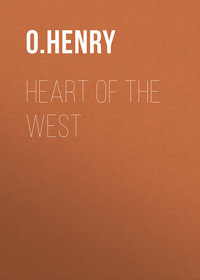

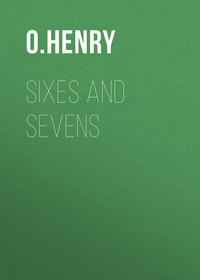

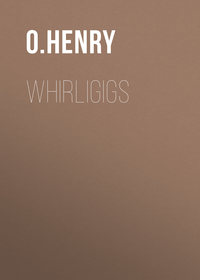
![Heart of the West [Annotated]](/covers_200/25561004.jpg)
